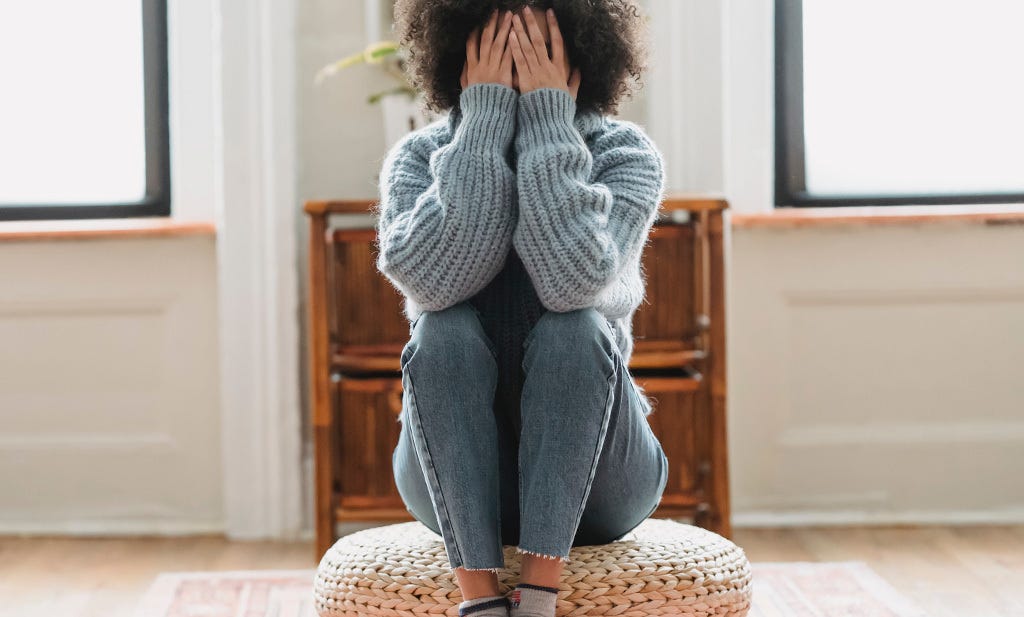
If you’ve just had a baby and are feeling sad, anxious or upset despite the happy occasion don’t worry. The first days and weeks after the birth can be a rollercoaster of emotions.
Many women may feel a bit down, tearful, or anxious in the first week. This is often called the "baby blues" and is so common that it's considered normal. The "baby blues" do not last for more than 2 weeks after giving birth. If your symptoms last longer or start later, you could have postnatal depression.
Our midwife Katrin Ritter tells you how you can tell the difference between baby blues and postpartum depression (PPD) and what you can do.
What are the baby blues?
Not just an old wives’ tale, the baby blues are real, affecting up to 80% of women after they give birth according to nct.org. Women who experience the baby blues can expect to feel down for a little while shortly after having their baby. Baby blues are noticeable, for example, through increased emotional sensitivity, mood swings or irritability. You may be laughing one minute and suddenly start crying - without knowing exactly why. Experience shows that the baby blues are more common among first-time mothers. No wonder, pregnancy and birth are highly emotional times. The causes are individually different, as numerous physical, hormonal, biochemical, psychological, social, and societal factors come together.
What are the symptoms of the baby blues?
If you’re going through the baby blues, you might feel:
- Emotional, irrational, or overwhelmed.
- Tiredness and exhaustion.
- Tearful (without knowing why).
- Moody.
- Feeling down or anxious.
How long do the baby blues last?
Symptoms might upset you at the time, but they are relatively mild and will usually pass within a few hours or up to 10 to 14 days after the birth. If they do not subside after that and become more severe this can lead to postpartum depression, peripartum depression, anxiety disorder, obsessive-compulsive disorder, or psychosis. If so, you should speak to your GP or health visitor about getting some help and support.
What can I do to prevent baby blues? The best tips:
- Know what to expect - While you’re pregnant, talk to your mum or friends who have had children about their experiences after giving birth. Ask your doctor questions. Knowledge is power, and being prepared can help. Make a check list of things that calm you down or make you happy, such as going for a walk, or having a cuppa with a friend. That way, when you’re feeling overwhelmed or sad, you can refer to that list.
- Ask for help - Tell your partner, family, or friends exactly what they can do for you. This could be taking care of your little one while you shower or go to the supermarket to do the weekly shop or making a few meals so you can enjoy uninterrupted time with your newborn. Your priority in the postpartum period is to recover from the birth, regenerate and bond with your new family member.
- Babywearing – Breast/chest feeding, cuddling and skin to skin contact promote bonding and ensures that the bonding hormone oxytocin is released. With ergonomic skin-to-skin baby carrying, you are close to your baby, you can feel their heartbeat, you can breast/chest feed and at the same time you have your hands free to do a few things in everyday life.
- Get out of the house - Having a new baby can feel isolating. Meet up with friends for coffee. Talk to them about what you are feeling. There can be strength in numbers. And don’t forget to enjoy the fresh air – you’ll find it may also help you sleep better! Strap on your baby carrier or take your stroller out and about for a little walk around your neighbourhood. Always seek advice, guidance, and approval from your midwife before returning to exercise. Read more about exercise during pregnancy and returning to fitness after birth here.
Postpartum depression and other illnesses: often a gradual development.
At the beginning, postpartum depression and the baby blues share many of the same symptoms, such as mood swings, crying, and feeling down. The difference is postpartum depression symptoms persist beyond the normal baby blues and they also are more severe.

According to the NHS, postpartum depression (PPD) is a common symptom, affecting more than 1 in every 10 women within a year of giving birth.
Symptoms for postpartum depression include:
- Extreme sadness and excessive crying.
- Intense irritability or anger.
- Severe mood swings and depressed mood.
- Anxiety and panic attacks.
- Insomnia or sleep addiction (hypersomnia)
- Overwhelming fatigue or loss of energy.
- Loss of appetite or excessive desire to eat.
- Reduced interest in activities you normally enjoy.
- Withdrawing from family and friends.
- Unable to concentrate or make decisions.
- Difficulty bonding with your baby.
- Feelings of shame, guilt, inadequacy or worthlessness.
- Thoughts of harming yourself or your child.
- Recurrent suicidal thoughts.
Dads and partners can experience depression in the first year after birth too.
According to nct.org, the number of men who become depressed in the first year after becoming a dad is double that of the UK general population. Twenty five percent of dads experience mild depressive symptoms and around 10% to 12% have a diagnosis of depression.
First time dads appear to be more vulnerable to postnatal depression than dads welcoming subsequent children.
Top tip: Plan regular mental health check ins with your partner, spouse or care giver and agree how to approach the conversation with each other and how to deal with any changing emotions.
Postpartum depression is a serious problem that should not be ignored. If you feel scared or out of control, tell your loved ones and seek advice from your midwife, charity, or support group.
If you’re worried about hurting yourself or your baby, call 911.
Baby blues or postpartum depression (PPD).
Going through a roller coaster of emotions after giving birth is normal for most new parents and usually subsides after a few days or weeks. If your baby blues, becomes more severe or does not decrease after a few weeks, seek help from your midwife to assess whether you have the symptoms of postpartum depression (PPD) or another mental illness.
You can talk to your partner, friends or family for emotional support or seek psychologically support from professional experts.
Having a baby brings many thoughts and challenges, and you don't have to deal with them alone. There is no shame in talking about your feelings, asking for help, and seeking professional advice.
UK charities and support groups include:
Pandas Foundation https://pandasfoundation.org.uk/
FREE helpline number 0808 1961 776
Infoline: 0300 123 3393
Anxiety UK https://www.anxietyuk.org.uk/
Helpline number: 03444 775 774
Text: 07537 416 905
The Association for Post Natal Illness https://apni.org/
Helpline number: 020 7386 0868
Footsteps counselling and care https://footstepscandc.org.uk/project/birth-trauma-association/
Helpline: 01452 308618
Email: office@footstepscandc.org.uk



















